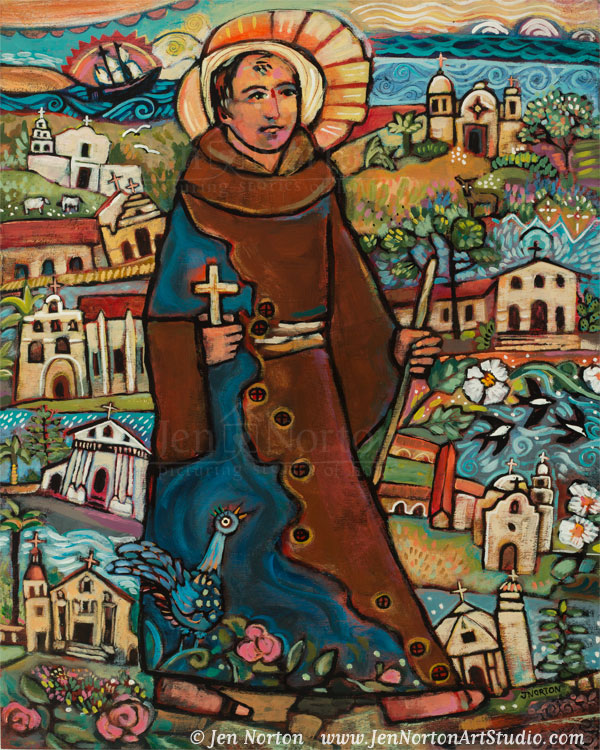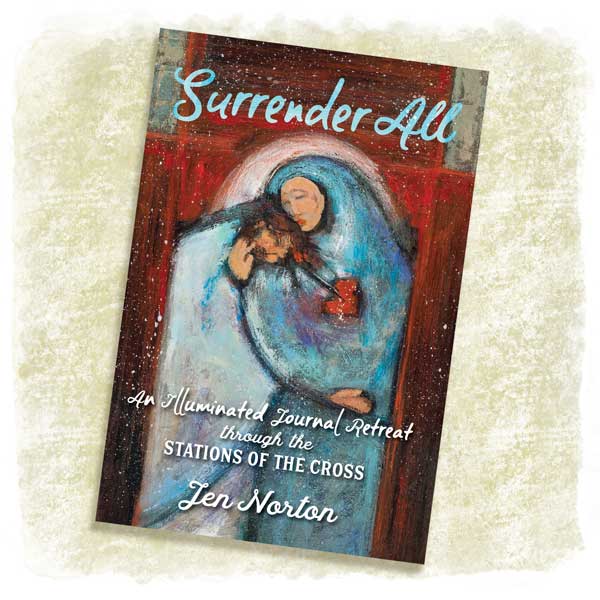Fr. Junipero Serra, founder of nine of the twenty-one California missions, is to be canonized (officially declared a saint by the Catholic church) later this year. If you aren’t familiar with Serra, he is an essential figure in California history, but also a controversial one. As it happens, I worked one summer during college for a history professor at Santa Clara University gathering information for the “beatification” of Fr. Serra, the first step towards canonization. This was back in 1986, so you can see the church, as it often does, deliberated and considered this new saint for quite some time before giving it the papal “go.” In September of 2015, he will be canonized as the patron saint of Vocations.
Whatever you may think of Serra, he is a story of brokenness and redemption found in each of us. He is the story of a man with a purpose, driven in spite of, or maybe because of, his faults and demons. He is the story of God’s grace sometimes being out of our range of vision. He is the story of persevering in what we believe in. And for some of us, he may also be a story of forgiveness.
Born in Majorca, Spain, Serra was a gifted intellectual who became a lector of philosophy in his early 20s, before his ordination to the Franciscan order of the Catholic priesthood. At 27, he left his secure post and sailed to the Americas. Upon his arrival in Vera Cruz, Mexico, he was so thankful to reach dry land he walked to his post in Mexico City on foot (about 250 miles or 405km). As a person who easily suffers from motion sickness and was once traumatized by a 3-hour whale-watching expedition, I completely understand that decision.
Along the way, he sustained a chronic foot injury, but would still choose to walk thousands of miles up and down California in his lifetime. He was known to display acts of self-mortification and self-denial and was obsessive about calling native peoples to penance in Christ. I have yet to see a picture of Serra where he looks happy and I believe him to be a man tortured by his own demons and perceived faults of the flesh, despite of his religious calling. I imagine him to be a chronic over-thinker with a well-defined sense of morality that, for whatever reason, he felt he fell short of. Don’t we all battle spirit over flesh, faith over doubt? He may have been extreme in his management of spirit, but he did choose to walk with his pain, not avoid it. I have to believe that gave him some level of compassion, and even his own writings suggest mercy in his treatment of the native population in contrast to the Spanish norms of the time, if not to our modern eye.
In 1768 he was appointed to lead a group of Franciscans who to were to take over the missions of Baja California after Spanish King Carlos III expelled the Jesuits. He went on to found nine missions in Alta California with the ideological vision of converting the native peoples. In the process, he also made California an economically viable trading partner with Mexico and a valuable outpost for Spain. And this is where the controversy lies, of course. None of this would have happened without the exploitation of the native labor force.
But as often happens in history where all things are interconnected, there is more than one viewpoint. I am not going to justify the enslavement or death by disease suffered by native Californians under Spanish colonialism. I can’t. But I can concede that in his time, “converting the uncivilized” was held as a worthy value by Europeans. Right or wrong, it is still a belief we see in the world today and part of our self-centered human nature. Don’t we always wish everyone thought the way we do, even if we don’t act on it? Add religious ideology and you’ve got the makings of a tough, but effective, system.
And then there’s the bigger picture. If it wasn’t for the economic strength of the Spanish-held missions (and military strength of its presidios), Russia may have taken much more of an interest in California. Or, more likely, it would have become part of Mexico. How would it have changed the shape of current America if Mexico had full military control of CA during the Mexican-American war? And what if that alternate outcome changed the game in the later Spanish-American war? If the US did not control the waterways of the Pacific or have authority in Guam or the Phlilipines, how might have that changed the course of the second World War? How would I even be telling you this story via my home computer had California not enjoyed the last century of vast resources and creative independence provided by American freedom? How are those (like me) who visit the beautiful restored missions or who are educated in associated schools inspired by the broken footsteps of Serra?
So you see, whatever you may think of Serra, whatever he may thought of himself in his limited vision, there was a bigger plan at play. We all have a mission, a vocation, a calling. We all try to do the best with the knowledge we have. We all make mistakes and inherently lack God’s full vision. We all do things, both big and small, that require forgiveness.
May God bless Fr. Serra and fulfill his mission of repentance and vocation in each of us so that his sainthood may be justified.
Fr. Serra’s Feast Day will be July 1
Art prints from my studio available in my Etsy shop.





